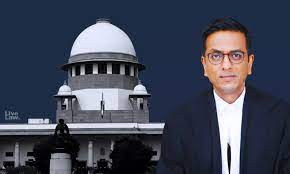
Supreme Court To Have New Annexe Building: CJI DY Chandrachud Assures Bar On Shortage Of Spaces. "It Is Extremely Close To My Heart."
The Indian legal system has been facing various challenges, and one of the most prominent among them is the lack of space. The shortage of space in courtrooms, law firms, and government offices has made it difficult for litigants and lawyers to carry out their work efficiently.
At an event hosted by the Supreme Court’s Committee on Gender Awareness and Internal Appeals, In the late celebration of International Women’s Day, India’s Chief Justice DY Chandrachud said, the efforts were also underway to create more space for the primary emphasis in the new building being designed by the PWD was to provide adequate space to lawyers and litigants.
This disparity is a given in every kind of court system which can be seen all around the globe, and this is no different than any other problem faced in the law world but having a CJI that addresses this issue head on has been an eye-opener and this has helped us to realize that the people of India are just as important issue than any other issue faced by our CJI DY Chandrachud, this feeling of relatability was also addressed by him in response to which he stated that:-
“Very often members of the Bar come to meet me. My problem is I cannot say no to any of their demands as that is the lawyer within me, who is saying how justified these demands are. But in the last five months, there was a CJI in me that cared about the organizational perspective. So sometimes there is a conflict between me as a lawyer and myself as the director of the Institute”.
With a genuine dedication to the legal profession and his sense of responsibility as a CJI, DY Chandrachud found himself in a dilemma. The growing need for space in courtrooms is also a major issue, as lack of sufficient space in courtrooms is one of the major challenges faced by litigants and lawyers in India.
Most courts across the country are overcrowded, making it difficult for litigants and lawyers to move around and effectively file cases. This leads to delays in court proceedings and ultimately affects the quality of judicial administration. The problem is especially acute in lower courts, where multiple cases are heard simultaneously, and litigants have to wait hours for their turn. During busy seasons such as summer and winter vacations, the number of pending cases increases and courts become even more crowded.
This further leads to inadequate office space for lawyers as they need sufficient office space to do their job effectively. However, lack of sufficient office space is a problem faced by many lawyers in India. Most of the country’s law firms are located in cramped buildings with limited space, making it difficult for lawyers to work efficiently.
In addition, rising real estate prices have made it difficult for lawyers to rent or buy prime office space. This limits your ability to attract customers and impacts your overall productivity. Fortunately, as revealed by CJI DY Chandrachud, the aforementioned issues are already underway to be resolved.
The Department of Public Works produced the first draft of the building and issued an order to form a building commission made up of his SC judges who would bring a wealth of experience to his successor as CJI. According to CJI, the PWD (Public Works Department) had already conducted the first lottery, and judges had given clear instructions. CJI said its primary focus is to provide sufficient space for key stakeholders, including attorneys and litigants.
In addition, the bar is in dire need of more space and will need to provide appropriate facilities for SCBA, SCAORA and the Association of Women Lawyers, PWD was told.
DY Chandrachud said: SCAORA has female lawyers who are members of both associations, and at least one of them. I believe women need their own space. This prioritization of women and lawyers was seen as an important step towards building a safer and more holistically developed country with a diverse lawyers and litigants.
He added that PWD has been instructed to ensure that the entire building is air-conditioned and is also exploring technical measures to prevent solicitors from being exposed to the “terribly hot” corridors. This is the area where I am also active.
“I can’t promise we’ll come up with a technical solution, but we’re working on it. We have a waiting room for lawyers and litigants so they can sit down instead of having to crowd the courtroom.” Quietly outside the courtroom, I waited for your laptop to be brought in,” he said, reaching for your brief, editing it, and working on it, whether the document was paper or not.
The Chief Justice is, in a sense, a friend of each of his colleagues, and some might call him primus inter pares (first among equals).
Lack of space is a major challenge for litigants and lawyers in India. It affects judicial quality, slows down court proceedings, and limits attorney productivity. Governments therefore need to address this issue by providing sufficient space for courts, law firms and public offices. This will improve the efficiency of the legal system and improve the quality of the country’s judiciary.








